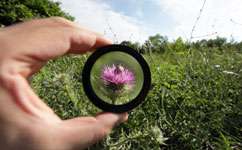Europe still has a rich reservoir of unknown species

You could be forgiven for thinking that all of Europe's plants and animals were discovered, documented and named a long time ago. But it turns out that nothing could be further from the truth.
Instead, it seems that Europe is still has a multitude of unfamiliar species.
After analysing European wildlife databases, researchers have found that new species are being discovered at a record rate – four times faster than they were over two centuries ago.
More than 770 new species – including beetles, freshwater fish and spiders – have been described and named every year since the 1950s. What's more, nearly two-thirds (60 per cent) of these are being found and described by amateurs.
"We were surprised at this figure. Everyone in this field knows that non-professionals play a large role, but this hadn't been quantified until now," says Dr. Benoît Fontaine from the Muséum National d'Histoire Naturelle in Paris, France, who led the study, which is published in PLoS ONE.
Researchers are now calling for a better system to support and guide this impressive workforce of so-called citizen scientists.
"We must speed up the inventory, for example by a better integration of amateurs with experts, otherwise we'll lose tens of thousands of species before we're even aware of them," says Fontaine.
"Citizen scientists, or non-specialists, are widely acknowledged as an essential part of the workforce in other scientific areas like ecology and astronomy. But the role of non-professional taxonomists is completely underestimated outside the taxonomic community," he adds.
So far, scientists have described nearly two million species across the globe. Some studies suggest that there may be as many as 30 million different types of plants, animals and fungi on the planet. The trouble is, at the current rate describing and naming all of them could take upwards of several centuries.
The science of describing, naming and classifying organisms, otherwise known as taxonomy, has long been recognized as a field in crisis.
"There's very little funding in Europe for this subject, partly because there's an assumption that everything has been discovered and that all new species are found in the tropics," says Fontaine. "So we don't have enough trained people."
Yet, funding for taxonomy hasn't dried up in the same way in the US and Australia. "This could be because they're seen as the New World, so there's still lots to discover," Fontaine says.
An incredible 17,000 new species are still being found worldwide every single year. Most are from the tropics, but this latest study demonstrates that there's still much to discover in Europe.
Fontaine and a huge international team of researchers found that for many European groups of species, such as mites, flies or snails, we haven't even reached a plateau. This is despite the region having more than its fair share of taxonomic expertise over the last 250 years.
"We know how many birds, freshwater mussels and dragonflies there are in Europe, but we have no idea how many ticks, nematodes or beetles there are," says Fontaine.
Not knowing how many European species there are means it's impossible to assess the full scale of the continent's biodiversity.
"It's not just about the utility, or ecosystem services – leisure, well-being, medicine, clean water – that we take from biodiversity; it's an ethical problem that we're wiping out species. All species have an intrinsic value," Fontaine says.
The team says to speed up the process of cataloguing all European living organisms, professional taxonomists should work more closely with non-professionals.
"One solution would be to integrate amateurs, who use traditional techniques such as the study of morphology of species, with professionals who use sophisticated techniques and equipment like genetic sequencing," says Fontaine.
"We hope these findings will focus the attention of decision-makers," he adds.
More information: Benoît Fontaine, et al. New Species in the Old World: Europe as a Frontier in Biodiversity Exploration, a Test Bed for 21st Century Taxonomy, PLoS ONE 7(5): e36881, published May 23, 2012, doi:10.1371/journal.pone.0036881
Journal information: PLoS ONE
Provided by PlanetEarth Online
This story is republished courtesy of Planet Earth online, a free, companion website to the award-winning magazine Planet Earth published and funded by the Natural Environment Research Council (NERC).




















